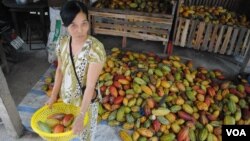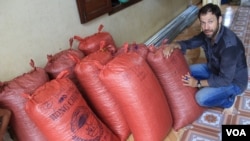HO CHI MINH CITY —
Vietnam's cocoa industry remains in its infancy despite efforts over the last century by various foreign powers to make it a cash crop. Two Frenchmen are using their country's colonial history, however, to try to make Vietnamese chocolate the latest culinary trend.
Cocoa farming is not well developed in Vietnam. Last year the country produced about 5,000 tons of the crop. In Indonesia, the world’s third largest producer, that number was 500,000 tons.
Most cocoa beans harvested in Vietnam are sent abroad to be processed into cocoa powder. The beans are not known for high quality. However, the work of Vincent Mourou and Samuel Maruta is helping to change that. They are the owners of Marou, a brand that sells single-origin artisanal chocolate from Vietnam, something they say is a world first.
Marou began in 2011 and processes between 10 tons and 20 tons of beans per year. These are collected from surrounding provinces and are processed in their own small-scale chocolate factory on the outskirts of Ho Chi Minh City.
“We work with farmers in five provinces, and we tend to go see each farmer once a month. In some provinces we work with several farmers, and some provinces we work with only one farmer, so depending on that,” said Maruta. The brand already has received a lot of attention in France, where much has been made of the colonial connection.
The French introduced cocoa to Vietnam in the late 19th century at the height of colonial rule. The trees were grown for about 20 years, but the production plan was not a success. Maruta said he found evidence of this in the national archives in France.
“It’s the decree from 1907 talking about the subsidies for the cocoa farmers saying it was completely useless, let’s scrap the subsidies,” he said.
The next introduction was in the 1980s when Russia offered to help Vietnam plant cocoa and sell the beans. That enterprise ended with the fall of the Soviet Union just over 20 years ago, though, and nearly all the trees were cut down.
Most of today’s cocoa trees were planted around a decade ago as part of donor-funded projects to supplement farmers’ incomes and combat deforestation.
Cocoa growers do not make much money, said Marou’s sourcing manager, Do Tan Hoa. He said cocoa is grown on mixed coffee/cocoa farms to supplement incomes, but that growing coffee is a lot more lucrative. He said that because Maruta and Mourou handpick the beans, they pay farmers a higher price, usually about $2.50 per kilo. By contrast, large companies pay 20 percent to 40 percent less. He added that Marou is still a small business and does not collect from each farmer regularly.
The slick packaging and distinctive flavor of the bars are proving to be a big hit with retailers in Europe, the U.S., Australia and Singapore.
Although the French connection is interesting for Europeans, Thibault Souchon, Food and Beverage Manager at the Metropole hotel in Hanoi, said not everyone is enamored with this part of the story.
“From a marketing point of view maybe, a lot of French TV, I think it’s interesting for the public going back to the roots, you can build a beautiful story through it, but from my perspective, French are French, it’s not important,” said Souchon.
He said in Europe many consumers consider luxury food products from countries like Vietnam to be exotic and glamorous. In developed countries closer to home, however, Vietnam is considered a source of cheap, low-quality goods.
As for Vietnam, sourcing manager Do Tan Hoa said his countrymen are not big fans of the dark, bitter chocolate Marou makes. They prefer sweet, milky chocolate.
Souchon, said Marou, is for the refined palate, and you need a bit of education before you can appreciate it. However, with bars selling at around $5 each, not many Vietnamese people will be able to afford the luxury.
Cocoa farming is not well developed in Vietnam. Last year the country produced about 5,000 tons of the crop. In Indonesia, the world’s third largest producer, that number was 500,000 tons.
Most cocoa beans harvested in Vietnam are sent abroad to be processed into cocoa powder. The beans are not known for high quality. However, the work of Vincent Mourou and Samuel Maruta is helping to change that. They are the owners of Marou, a brand that sells single-origin artisanal chocolate from Vietnam, something they say is a world first.
Marou began in 2011 and processes between 10 tons and 20 tons of beans per year. These are collected from surrounding provinces and are processed in their own small-scale chocolate factory on the outskirts of Ho Chi Minh City.
“We work with farmers in five provinces, and we tend to go see each farmer once a month. In some provinces we work with several farmers, and some provinces we work with only one farmer, so depending on that,” said Maruta. The brand already has received a lot of attention in France, where much has been made of the colonial connection.
The French introduced cocoa to Vietnam in the late 19th century at the height of colonial rule. The trees were grown for about 20 years, but the production plan was not a success. Maruta said he found evidence of this in the national archives in France.
“It’s the decree from 1907 talking about the subsidies for the cocoa farmers saying it was completely useless, let’s scrap the subsidies,” he said.
The next introduction was in the 1980s when Russia offered to help Vietnam plant cocoa and sell the beans. That enterprise ended with the fall of the Soviet Union just over 20 years ago, though, and nearly all the trees were cut down.
Most of today’s cocoa trees were planted around a decade ago as part of donor-funded projects to supplement farmers’ incomes and combat deforestation.
Cocoa growers do not make much money, said Marou’s sourcing manager, Do Tan Hoa. He said cocoa is grown on mixed coffee/cocoa farms to supplement incomes, but that growing coffee is a lot more lucrative. He said that because Maruta and Mourou handpick the beans, they pay farmers a higher price, usually about $2.50 per kilo. By contrast, large companies pay 20 percent to 40 percent less. He added that Marou is still a small business and does not collect from each farmer regularly.
The slick packaging and distinctive flavor of the bars are proving to be a big hit with retailers in Europe, the U.S., Australia and Singapore.
Although the French connection is interesting for Europeans, Thibault Souchon, Food and Beverage Manager at the Metropole hotel in Hanoi, said not everyone is enamored with this part of the story.
“From a marketing point of view maybe, a lot of French TV, I think it’s interesting for the public going back to the roots, you can build a beautiful story through it, but from my perspective, French are French, it’s not important,” said Souchon.
He said in Europe many consumers consider luxury food products from countries like Vietnam to be exotic and glamorous. In developed countries closer to home, however, Vietnam is considered a source of cheap, low-quality goods.
As for Vietnam, sourcing manager Do Tan Hoa said his countrymen are not big fans of the dark, bitter chocolate Marou makes. They prefer sweet, milky chocolate.
Souchon, said Marou, is for the refined palate, and you need a bit of education before you can appreciate it. However, with bars selling at around $5 each, not many Vietnamese people will be able to afford the luxury.







